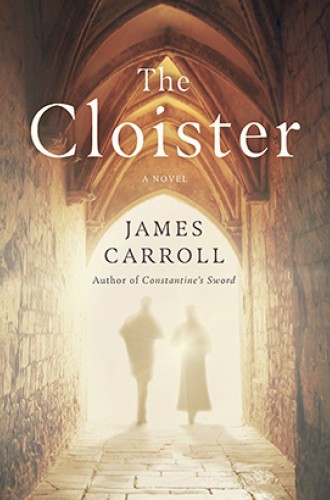A novel about centuries of Jewish-Christian relations
James Carroll tells a story of faith, reason, and freedom.
In 2001, James Carroll wrote Constantine’s Sword, an unrelenting, unforgiving 756-page history of Christianity’s sin of anti-Semitism. Hatred of Jews, he argued, was embedded in the Gospels from the beginning and was formalized when Constantine, in an effort to restore the Roman Empire under his rule, seized the cross as a symbol of military power at the Battle of Milvian Bridge in 312 and then summoned the bishops to Nicaea in 325 to formulate a creed. Now the church could determine who was in and who was out—and enforce it with a sacred sword. Hating Jews became doctrine.
In an earnest lament that some scholars regard as overly simplistic, Carroll claims that if only the church had followed Abelard’s lead in the 12th century toward a humane and faithful reconciliation between Christian and Jews—if only the church hierarchy had paid more attention to his theology and less to his love for his brilliant student, Heloise—history would have been different. “After a thousand years of misbegotten Jew hatred . . . this profoundly Catholic thinker lifted the pike on a road toward Jewish-Christian mutuality, a road leading to an end to hatred and the beginning of real respect. Alas for the Church, and more so for the Jews, it was a road not taken.”
Read our latest issue or browse back issues.
In The Cloister, Carroll takes us down that road, using elements of his own biography to create a story of faith, reason, forgiveness, and freedom. His father was in the air force and stationed at the Pentagon, so Carroll learned his first lessons of prejudice in the “old South” of suburban Virginia. When the family was transferred to Germany in the early 1950s, he began to learn about the Holocaust and see its continuing destructive power. He became a Catholic priest but eventually left the priesthood, shifted his focus to writing, and got married.
The Cloister is a novel of ideas set in the early 1950s. Father Michael Kavanaugh is a Catholic priest serving a small parish on an unfashionable stretch of Broadway at the northern tip of Manhattan when he inadvertently meets Rachael Vedette, an agnostic French Jew. They each begin a journey to find a way out of the cloisters in which they have found security if not satisfaction. What develops is not a romance but a strenuous—and, at times, contentious—conversation about truth.
Carroll ties Michael and Rachel’s self-discoveries to the earnest discussions he imagines between Abelard and Heloise. He re-creates a young Abelard, the charismatic professor, engaging a room full of students in a dialogue about truth. “We poor humans do not possess the Truth,” he declares. “We are pilgrims, ever on the way to it. And the mode of the pilgrimage—investigating, assessing, judging, deciding—is thought.”
Even after expulsion from the academy for his rational theology, castration because of his love for Heloise, and monastic exile for insulting the church, Abelard maintains his devotion to reason. After years apart, Abelard and Heloise are reunited at the abbey where Heloise has lived out her intellectually energized faith. She persists in her love for Abelard: “There is no appeasing God because God does not need appeasement. God is love, pure and simple.”
Abelard does not repent either. “What makes me contentious is that I give primacy to logic, not faith. I think! That begins everything. I think! We cannot believe what we do not understand.” His devotion to a logical faith ultimately leads to his trial before Bernard of Clairvaux and other pontifical delegates, where he is found guilty of “reimagining the faith.”
The character who connects Michael and Rachel of 1950s New York City with Abelard and Heloise of 12th-century France is Rachel’s father. Saul Vedette, a Jewish scholar, has devoted his life to recovering medieval manuscripts that had been cast aside during the anti-Catholicism following the French Revolution. In that work he encounters Abelard, and he is particularly moved by Abelard’s sense of God’s goodness that requires the reconciliation of Jews and Christians.
Carroll tells in painful detail of the devotion Rachel shows her father, the interrogation that leads to their arrests, and their life together in a concentration camp north of Paris. The complex ethical choices that unfold for Rachel and her father in the camp haunt Rachel in the years that follow, leading her to seclude herself in a cloister of her own regret.
And Michael’s cloister of self-entrapment? The novel begins with Michael serving the Eucharist at the first mass of a weekday morning. To his surprise, he sees a former clergy colleague kneeling at the railing. Before Michael can serve him, the man jumps to his feet and runs out of the church. As soon as the mass concludes, Michael goes searching for him and wanders into the Cloisters, a Rockefeller-funded reconstitution of bits of European monasteries that is part of the Metropolitan Museum of Art. It’s there that he meets Rachel, a self-protective docent, and the two begin their cautious, uncertain, and sometimes painful conversation.
But it’s his search for his former colleague that begins Michael’s move toward liberation. In a confrontation with his bishop, Michael discovers a lie told about his friend for which he wrongly has felt guilty for years. That leads him to challenge the bishop over the essential lie of Christianity that the Jews are to be hated for killing Christ, with Abelard serving as his source. This conversation is pivotal in Michael’s search for freedom.
With a narrative that spans centuries and faith traditions, Carroll challenges his readers to ask: Where are we cloistered? What do we think, and how does that shape our faith? What is calling us to be free? And do we have the courage to follow that road?







